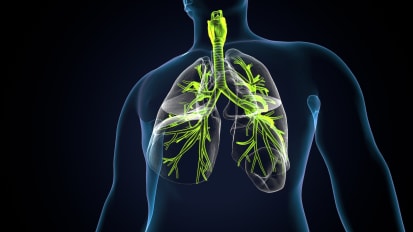Search Videos and More
 Video
Video
Bronchoscopic Lung Volume Reduction in Patients with Advanced Emphysema
As part of the Pulmonology On Air 2022 Global Event, Gerard Criner, MD, FACP, FACCP, Director of the Temple Lung Center, demonstrates a LIVE endobronchial valve placement on a patient with advanced homogenous emphysema. News
News
Advanced COPD Fact Sheet
As the nation’s leading COPD research and treatment center, Temple sets new standards for COPD care. Course
Course
COVID Pneumonia
"COVID pneumonia represents the active inflammation of the pulmonary parenchyma that is caused by SARS-CoV-2, the coronavirus that has caused the COVID-19 pandemic. Millions of patients have been affected worldwide and hospitalizations have occurred all over the globe. The condition can range from mild to severe and represents a challenge for clinicians. Despite the above there is still significant morbidity and mortality associated with COVID pneumonia. It is important for clinicians to recognize this entity, and follow closely the rapidly changing recommendations regarding management and treatment." Course
Course
Recognizing and Treating Tracheobronchomalacia
"Tracheobronchomalacia (TBM) is an under-recognized cause of shortness of breath, recurrent respiratory infections and chronic coughing. It involves collapse of the main airways, due to a weakness of the cartilage and/or floppiness of the posterior membranous wall. The activity will inform physicians and advanced practitioners about the importance of a multidisciplinary approach in the management of TBM, from diagnosis to treatment. We emphasize the need of reserving surgery to severely symptomatic patients who fail medical therapy, and the importance of objective long-term follow-up of this challenging condition." Course
Course
GOLD International COPD Conference
Join us in person or online for an international comprehensive educational symposium on chronic obstructive pulmonary disease (COPD). This is the seventh consecutive year for this one-day COPD conference. Wednesday, November 16, 2022 from 8:00 AM – 6:00 PM EST Document
Document
Advanced Asthma Fact Sheet
While many cases of asthma can be managed in a primary care setting, 5–10% of patients have asthma that cannot be controlled by standard treatments. Document
Document
Broncoscopic Lung Volume Reduction Physician Fact Sheet
For patients with emphysema and severe hyperinflation whose symptoms cannot be managed using medication or oxygen therapy alone, doctors may resort to surgical resection of the worse regions of emphysema to reduce air trapping and improve patient outcomes Document
Document
Temple Lung Center Physician Guide
Thanks to our collaboration with physicians like you, we are now one of the largest pulmonary centers in the region (over 32,000 patient visits per year). We also perform 13,000 pulmonary function tests and 1,000 bronchoscopies every year. News
News
Sarcoidosis PH Case Study
Bernard is a 37-year-old man with sarcoidosis initially diagnosed by lung biopsy in 2009. The sarcoidosis affects his skin, lungs, lymph nodes, and liver. He was referred to the Temple Lung Center for a lung transplantation evaluation due to severe pulmonary hypertension and poor exercise capacity. He had severe dyspnea, chronic dry cough, and chest tightness, as well as palpitation and dizziness. His constitutional symptoms included weight loss and fatigue. News
News
Interstitial Lung Disease Program Referral Information
Patients with interstitial lung disease require care from a multidisciplinary team of experienced physicians, an active research program, and a commitment to patient education. The Temple Lung Center’s Interstitial Lung Disease Program is a national leader in all three areas, offering a physician leadership team with decades of experience at Temple, a research program that publishes often and is supported by the NIH and private industry, and a wide range of educational programs for patients, caregivers and physicians. News
News
Tracheobronchial Malacia Referral Information
The Tracheobronchomalacia (TBM) Program at the Temple Lung Center offers patients with this rare and often under-recognized condition, a multidisciplinary medical team led by specialty-trained thoracic surgeon Charles Bakhos, MD, FACS. Course
Course
Management of Early Stage Non-Small Cell Lung Cancer
Presented by Fox Chase Cancer Center, the Temple Lung Center, and the Temple Health Office for Continuing Medical Education, this conference is designed as a forum for discussion of advances in technology and treatment of early stage non-small cell lung cancer. Multidisciplinary perspectives, including medical, surgical and radiation oncology, pulmonology and radiology will be presented.
